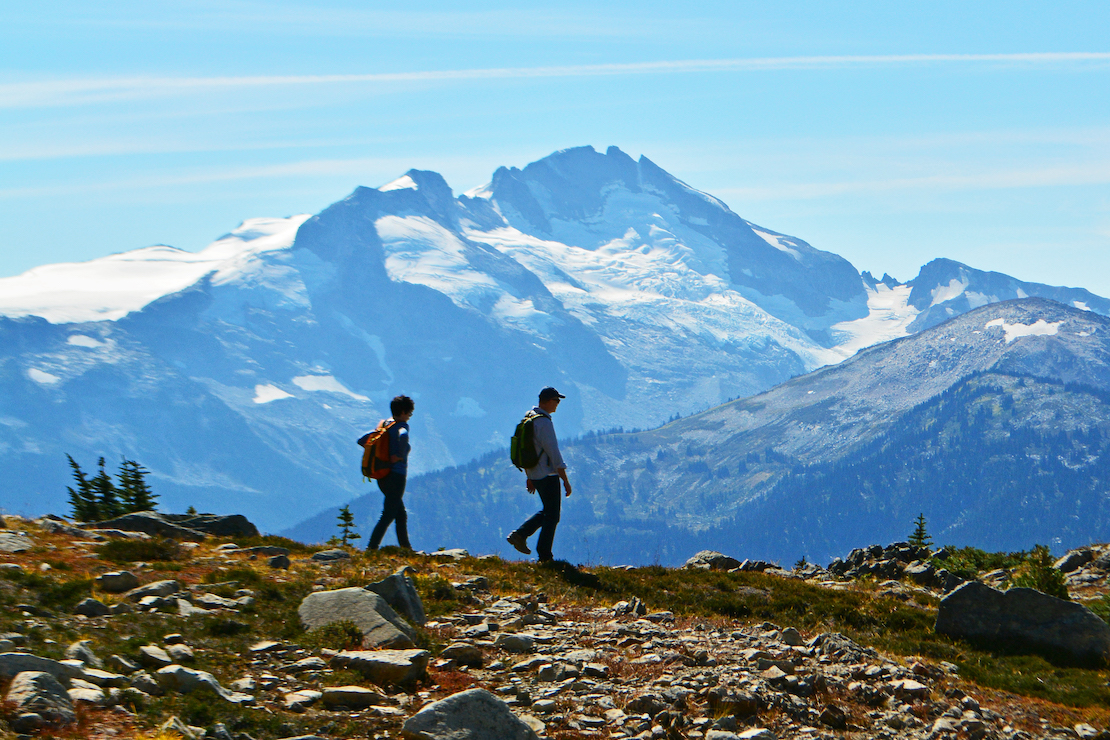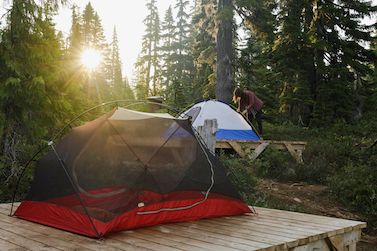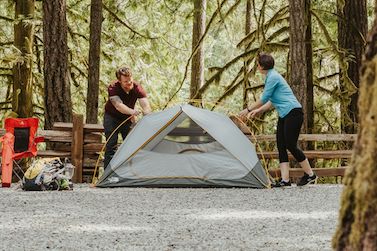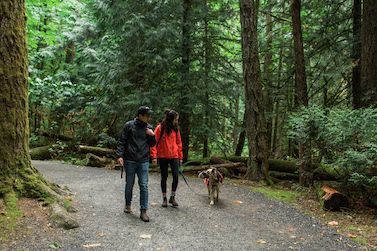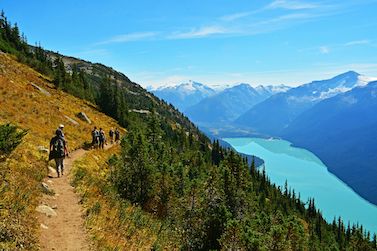The BC Parks system includes many remote backcountry areas where we do not provide any facilities. For people with extensive outdoor experience, these wilderness areas can offer exciting multi-day hiking and camping adventures.
The term ‘backcountry’ refers to an area more than 1 km from any highway or park road.
BC Parks uses the term ‘wilderness’ to refer to backcountry areas with no formal campgrounds or other facilities.
We acknowledge the vital stewardship role Indigenous Peoples have always taken in these areas.
In most wilderness areas where camping is allowed, you do not need a camping reservation or permit. Garibaldi Park is the only BC Park that requires a reservation for wilderness camping.
Look on this page for information about:
Wilderness camping opportunities
Not all BC Parks allow wilderness camping, but many do. In most parks where it is allowed, you do not need a reservation or permit. However, you should always check the park’s webpage for any information on wilderness camping policies.
Use our find a park tool to locate a specific park’s webpage. Check the ‘camping’ section for information on wilderness camping.
The only wilderness area that currently accepts camping reservations is in Garibaldi Park, near Whistler. For more information, see Garibaldi Park Wilderness Camping Area, below.
Any trip to the wilderness is potentially dangerous, and wilderness areas also have especially sensitive ecosystems. Review the safe and responsible wilderness camping section, below, when planning your trip.
When visiting remote areas of British Columbia, please remember that many of these areas have special importance to Indigenous Peoples. For more information, please visit the Indigenous relations and reconciliation page.
Some parks have special requirements for wilderness camping. Find a park’s webpage and see if it has wilderness policies you should know about.
Garibaldi Park Wilderness Camping Area
Garibaldi Park includes a Wilderness Camping Area for skilled outdoorspeople who have extensive backcountry experience. We offer wilderness camping to facilitate climbing, mountaineering, ski touring, and other highly challenging activities.
Wilderness camping is only allowed in the Wilderness Camping Area, and you must make a reservation. No facilities or designated campsites are provided. For area boundaries, see the Wilderness Camping Area map [PDF].
We can only accept Garibaldi Park Wilderness Camping Area reservations via our call centre. You cannot make a Wilderness Camping Area reservation online. To learn more, see making a reservation, below.
Before making a Garibaldi Wilderness Camping Area reservation, please read the rest of this page in full. Look in this section for information on Wilderness Camping Area policies related to:
Trips into the Wilderness Camping Area can be dangerous and should not be taken lightly. To learn about requirements for wilderness camping, see safe and responsible wilderness camping, below.
Camping party sizes
- Reservations can be made for groups of up to 10 people, all of whom must be experienced wilderness travellers
- School groups of up to 20, with one adult for every five students, are allowed in the Wilderness Camping Area
- Because BC Parks only accepts groups of up to 10, any school group over 10 people requires multiple reservations
- School groups must fill out the school group registration form well in advance, in addition to making reservations
Making a reservation
- Garibaldi Park Wilderness Camping Area reservations must be made by phone and cannot be made through our online reservation service
- Any experienced wilderness traveller 16 years of age or over can make a reservation by calling 1-800-689-9025 (1-519-858-6161 internationally)
- A Wilderness Camping Area reservation can be booked in full up to three months before your desired arrival date
- You can make your reservation starting at 7 am Pacific Time on the first day of this booking period
Example: If you want to arrive on July 25 and stay four nights, you can reserve all four nights starting at 7 am on April 25
- You can make a reservation up until 5 pm Pacific Time on your scheduled arrival date, if space is available
Example: If you want to arrive on July 25 and stay for four nights, you can book all four nights up until 5 pm on July 25
- Reservations cannot be transferred or sold to another party, and attempting to do so leads to cancellation without refund
Named occupant
- When booking your reservation, you must specify the ‘named occupant’ who will be your official reservation holder
- This can be yourself or another person, but they must be present when your party arrives and throughout your stay
- If they cannot be present throughout your stay, your reservation must be rebooked with an occupant who can be present
- The named occupant may be asked to show ID during your stay to keep your reservation valid
Fees
All fees must be paid in full when you make your reservation. There are two types of fees:
- Camping fees, which pay for use of the Wilderness Camping Area
- Transaction fees, which help us maintain the reservation service
Garibaldi Park Wilderness Camping Area fees
| Camping fees (per person per night) |
|
|---|---|
| Transaction fee (per reservation per night) | $6 |
BC Parks updated its camping fees in 2026. This included increased fees for the Wilderness Camping Area. There is also now an additional non-resident fee applied to visitors who do not live in B.C. It is a $20 flat rate.
For more information on fee updates, please see the 2026 fee changes section of the camping fees page.
We charge a maximum overall transaction fee of $18 per reservation. Tax is included in camping fees, but tax is added to transaction fees. If you change or cancel your reservation, there will be additional fees (see changes and cancellations, below).
Normally, there is also a $5 surcharge for any reservation, change or, cancellation made via the call centre. We are currently waiving the call centre surcharge for all Wilderness Camping Area transactions.
For more information about camping fees and transaction fees, see the camping fees page.
Changes and cancellations
- Changes and cancellations must be made by phone and cannot be made through our online reservation service
- You can change or cancel your Wilderness Camping Area reservation by calling 1-800-689-9025 (1-519-858-6161 internationally)
- You pay all your fees when making a reservation, using Visa, Visa debit, Mastercard, Mastercard debit, or American Express
- There is an extra $6 transaction fee for cancelling or making any changes to your reservation
- You cannot make changes to your reservation itinerary after you arrive at the park
- If you cancel before arriving, camping fees may be refunded, subject to policies outlined on the cancellations and refunds page
- Your transaction fees, which include change and cancellation fees, cannot be refunded
For more information on getting a refund, see the cancellations and refunds page. For full details of our cancellation and refund policies, download the reservation services policies and terms [PDF].
Safe and responsible wilderness camping
Any trip to the wilderness is potentially dangerous. Staying safe in the wilderness requires special skills and equipment. Wilderness areas also have especially sensitive ecosystems.
Many remote areas of British Columbia also have special importance to Indigenous Peoples.
Safe and responsible behaviour is especially important in the wilderness. Always follow Leave No Trace outdoor ethics. For general information on Leave No Trace, see our backcountry guide.
To help ensure your trip to the wilderness is safe and responsible:
Do your research
- Design a trip plan and travel route appropriate for your outdoor skill level (see make a trip plan, below)
- Ensure you have any outdoors equipment, skills, or training you may need (see pack the essentials, below)
- Check reliable sources for up-to-date information about your route, including the Government of Canada weather forecast
- Use our find a park tool to check the park’s webpage for advisories, trail reports, and other updates
- For any winter trip to a mountainous area, check the avalanche forecast on the Avalanche Canada website
Make a trip plan
Always make a trip plan before any wilderness camping trip, using the AdventureSmart trip plan tool. Leave it with a friend or family member who can notify the authorities if you do not return when expected. Stick to the plan throughout your trip, so you can be found in an emergency.
Plan to travel in a group so that your companions can help each other if you run into trouble. Make sure everyone in your group is prepared and has all the skills, experience, and equipment they need. Set realistic goals and ensure everyone in the group will be able to achieve these.
Pack the essentials
It is always vital to bring appropriate equipment when visiting a BC Park. Wilderness adventures require more specialized equipment. Carry the following items, and make sure everybody in your party knows how to use them:
- Fire-making kit and emergency blanket or shelter
- Whistle or other signalling device
- Extra food, water, and clothing
- Flashlight and pocket-knife
- First aid kit and sunscreen
- Navigation equipment
If possible, carry a communication device that will work throughout your planned route. For instance, a satellite phone will work when there is no cell phone reception. This allows you to call for help or alert others in emergencies. But it is better not to depend on technology. Always bring a print map and guide.
Camp responsibly
Wilderness areas, by definition, do not provide any formal camping facilities. Some areas have very basic campsites, established by previous visitors. Use these whenever they are available, to minimize your impact on the environment.
During your trip, you must also:
- Camp at least 30 m away from any lake, stream, or other water source
- Follow Leave No Trace outdoor ethics
For more information on Leave No Trace outdoor ethics and staying safe in the wilderness, see our backcountry guide.
